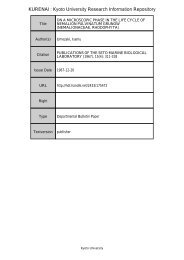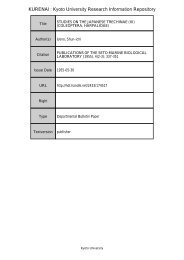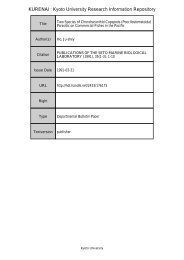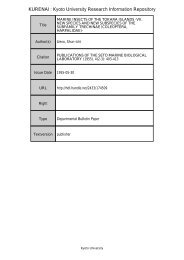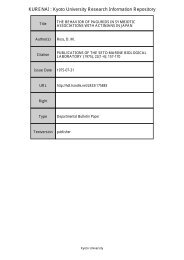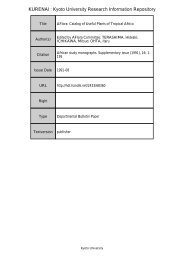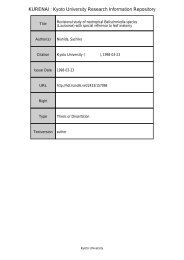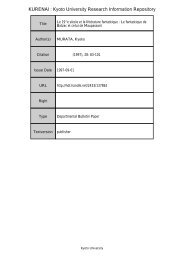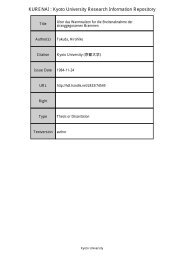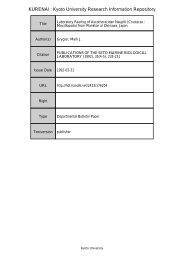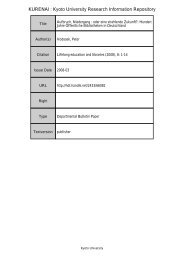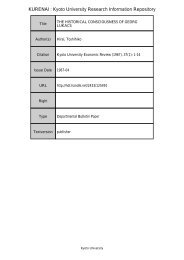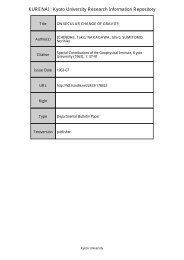Remaindered Life of Citizen-Man, Medium of Democracy
Remaindered Life of Citizen-Man, Medium of Democracy
Remaindered Life of Citizen-Man, Medium of Democracy
You also want an ePaper? Increase the reach of your titles
YUMPU automatically turns print PDFs into web optimized ePapers that Google loves.
N. TADIAR: <strong>Remaindered</strong> <strong>Life</strong> <strong>of</strong> <strong>Citizen</strong>-<strong>Man</strong>, <strong>Medium</strong> <strong>of</strong> <strong>Democracy</strong><br />
This is the contemporary context <strong>of</strong> an ongoing process <strong>of</strong> “humanization,” whose longer<br />
colonial history I am interested in unraveling. To think about this longer colonial history <strong>of</strong><br />
“humanization” on which contemporary projects <strong>of</strong> global governmentality depend, we have to<br />
see U. S. imperialism as more than simply a historical event <strong>of</strong> political-military occupation or a<br />
form <strong>of</strong> direct or indirect domination. We have to also understand it as a project <strong>of</strong><br />
standardization <strong>of</strong> life forms, as a universalization <strong>of</strong> norms and their concomitant regimes <strong>of</strong><br />
intelligibility. As we gleaned from the Junior <strong>Citizen</strong> textbook, these norms include the citizen<br />
as a subject <strong>of</strong> property, based on a conception <strong>of</strong> nature specifically, land as a thing<br />
bearing potential exchange value realizable through productive labor.<br />
As an institution <strong>of</strong> governmentality, the system <strong>of</strong> mass education established by the U. S.<br />
colonizers was an apparatus for the generalization <strong>of</strong> the social bases <strong>of</strong> capitalist democracy<br />
through the “standardization” <strong>of</strong> life and the production <strong>of</strong> “the average” man. While education<br />
under Spanish colonialism had aimed to produce obedient subjects <strong>of</strong> religious doctrinal<br />
authority (and only later with the liberal reform <strong>of</strong> education in 1863, exemplary subjects <strong>of</strong><br />
enlightened learning and civic as well as moral virtue), the educational system under U. S.<br />
imperialism sought to produce a broad citizenry capable <strong>of</strong> democratic self-government, which<br />
meant a new organizing conceit for its policies: “the masses.” 5) As the Filipino educator and<br />
statesman, Camilo Osias wrote, the Philippine Assemblyʼs passage <strong>of</strong> several Acts, which<br />
provided for the construction <strong>of</strong> schools in the rural areas, demonstrated the awareness <strong>of</strong><br />
Philippine leaders that “the stability <strong>of</strong> democracy here in these Islands depends in a great<br />
measure upon the character and intelligence <strong>of</strong> the average people” [Osias 1921: 5]. The<br />
conception <strong>of</strong> “the greater part <strong>of</strong> the Philippine population” as “the average people” is<br />
intertwined with the emerging idea that democracy entails a certain raised “standard <strong>of</strong> life”<br />
among its citizenry as a condition <strong>of</strong> freedom. Reflecting an amalgamation <strong>of</strong> prevailing ideas on<br />
education in the U. S. that might be described as technocratic humanist, Osias understood the<br />
economic independence <strong>of</strong> individuals as an important component <strong>of</strong> the freedoms for which<br />
education was to train its pupils, a prerequisite for developing in them greater “social<br />
efficiency” and higher tastes that would ultimately lead to a richer, larger, better life [ibid.:<br />
7-8]. 6) He argued,“[I]n a community where the members are poor and contented, where the<br />
people are more or less indifferent to community needs and interests.... In such a community<br />
there is need <strong>of</strong> preaching the spirit <strong>of</strong> discontent. The people must be led to acquire higher<br />
5) In 1905, James A. LeRoy distinguished the system <strong>of</strong> education established by the U. S. from that <strong>of</strong><br />
the Spanish (which despite the reforms <strong>of</strong> 1863 continued to reflect a trenchant “mediaevalism” in<br />
methods and curriculum) by this focus: “Characteristically American was also the determination<br />
from the very outset that it was the education <strong>of</strong> the masses which primarily required attention.<br />
Upon this decision has followed, naturally and logically, all the other features which have come to<br />
form what is called ʻAmerican educational policyʼ in the Philippines” [LeRoy 1905: 214].<br />
6) The technocratic aspect <strong>of</strong> Osiasʼs vision is evidenced in his abundant emphasis on “efficiency” as<br />
simultaneously a capacity <strong>of</strong> individuals to be developed, a characteristic <strong>of</strong> schools to be measured<br />
and improved, and an ideal <strong>of</strong> individual and collective human life (alongside freedom and happiness).<br />
469




